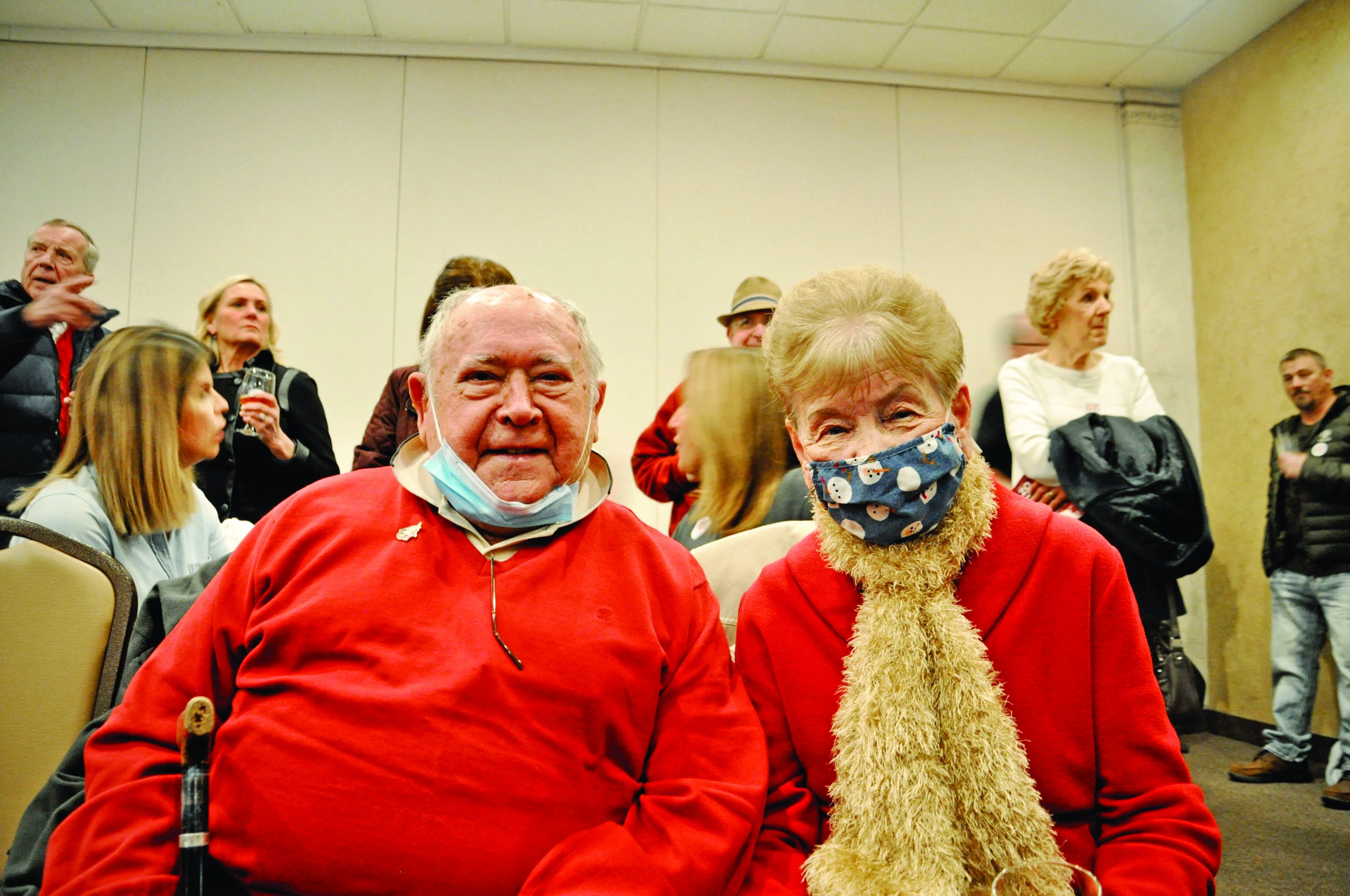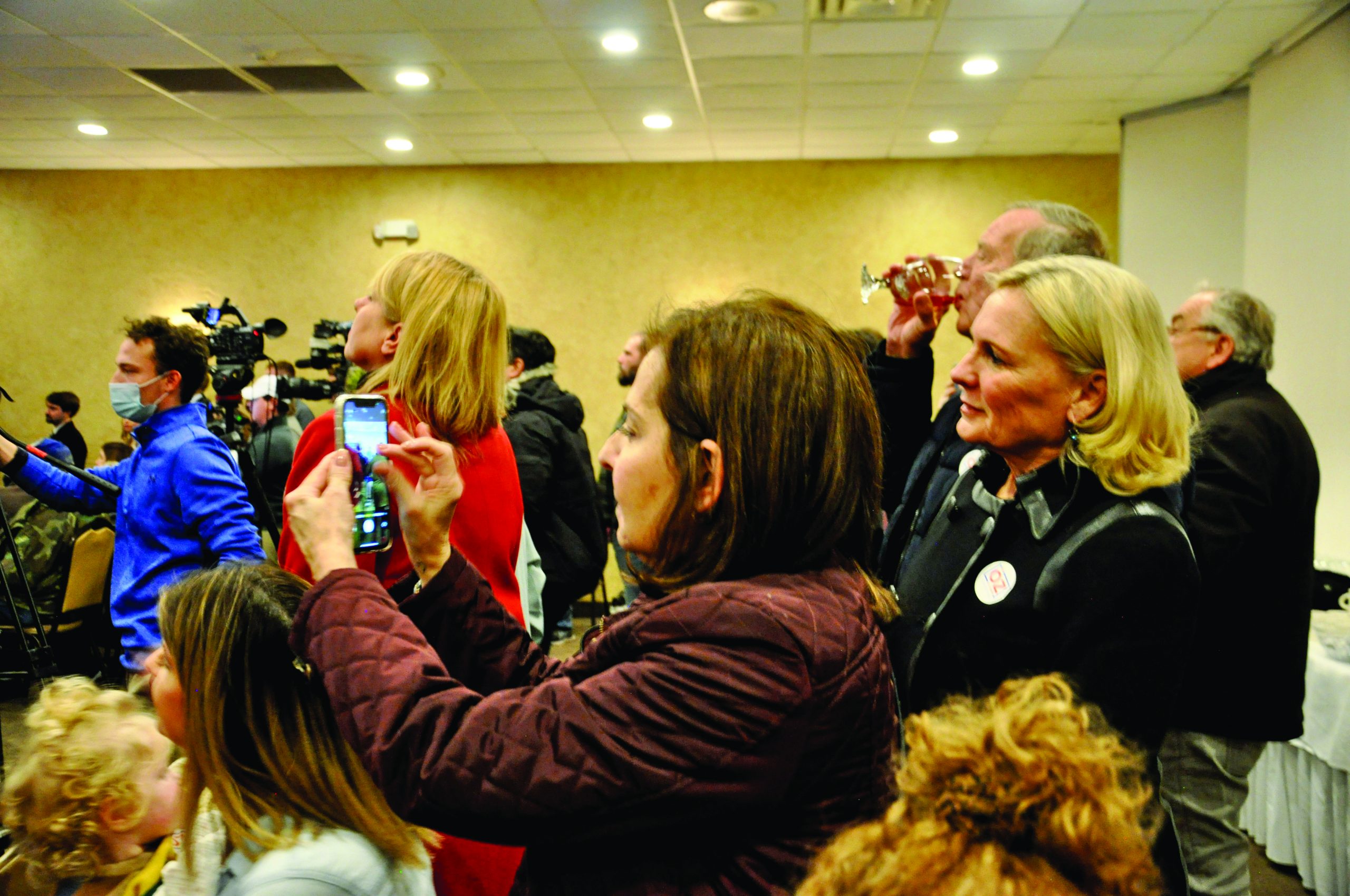Sondra Long and her husband David were among the 250-plus curiosity seekers at Giannilli’s II restaurant in Westmoreland County, Pennsylvania, waiting to hear Dr. Mehmet Oz make his case to be the Republican nominee for U.S. Senate.
Long, 82, sitting in a folding chair at the back of the crowded room with her husband of over 50 years, was just there to “kick the tires and see what he is about.”

“He isn’t the first candidate I checked out, and he won’t be the last,” she said, though the Obama-Trump voter was adamant about not backing the Democrats this time either.
Seconds later, with Van Halen’s “Jump” bouncing off the walls and the aroma of Italian cooking coming from the kitchen a few feet away, Oz breezes into the crowded room in the back of the restaurant.
Before the last chords die off and the applause fades away, Oz asks the crowd, “How many of you think Washington got it wrong on COVID? How about the economy? Paying people not to work? How about the border? How about schools?”
It’s clear Oz and his audience are on the same page. “Are you ready for a dose of reality? Let’s do this!” he exclaims, and for the next hour, the attendees watch a campaign event that seems more like a talk show. Unsurprising, considering Oz’s celebrity status is due primarily to his own talk show, which sprang out of years of popular appearances on The Oprah Winfrey Show.
As he both enters and exits the room, he takes selfies with dozens of audience members. Two days later, after a tour of the redevelopment work being done in downtown Erie, he attracts another crowd of selfie-takers.
Celebrity politicians in Pennsylvania aren’t terribly common. Prior to his TV success, Oz was already a heart surgeon and New York Times bestselling author. The clamoring for his attention was repeated in Scranton, Meadville, Grove City, Cranberry Township, and Upper St. Clair — a hodgepodge of working-class towns and upper-class suburban neighborhoods in the northeast and western corners of the state.
When someone fainted at a caucus meeting in suburban Pittsburgh and called out for a doctor, Oz rushed to his side to stabilize him — a medical situation he said all doctors face when they are out in public and that has happened to him several times over the years. “I was in Newark Airport less than a year ago … and a guy collapsed right next to my daughter. Blue dead. I tore his shirt off. He had a scar down his chest. He’d had heart surgery. I did CPR on him, together with Port Authority guys. We were able to shock him back. Took a couple shots. And the man survived. We stented his artery. And he came on my show a week later.”
If he weren’t running for office, the Cleveland-born surgeon might consider the attention overwhelming. But he is running, and he is using every ounce of that name recognition to his advantage.
Will it work?
Most voters weren’t ready to commit — like Barb Koontz of Harrison City, who said she did like what she has heard from him so far, “especially on the economy and the border.”

The initial challenges Oz faces include his lack of roots in the state (he has spent the bulk of his life living in New Jersey), his policy-position unknowns, and his business dealings — information sure to surface as the race starts to form.
His campaign said he made his dutiful trip to Washington to meet with Minority Leader Mitch McConnell to make his case to the Kentuckian on why he makes the best nominee in arguably the most important Senate contest in the country.
Oz entered the Republican primary days after the favored son Sean Parnell exited; Parnell, who led in the polls and had earned the coveted endorsement from Donald Trump, left when a judge cited his run for Senate as the reason he ruled against him in a custody dispute.
Former George W. Bush administration Treasury official and West Point graduate David McCormick, conservative commentator Kathy Barnette, real-estate investor Jeff Bartos, and Carla Sands, who was Trump’s ambassador to Denmark, are also vying for the nomination.
In an interview with the Washington Examiner, his first since announcing his candidacy in November, Oz said he has learned a lot about the state. By the end of his string of western Pennsylvania events, Oz said he had hit his stride: “We had a blast. Every day was better. We traveled up and down the western part of the state and really got to know what is driving people in this election.”
From healthcare professionals to food service workers, Oz peeled off examples of frustrated voters who did all that was asked of them during the pandemic and then felt abandoned by Washington. “Their point was they’d done their job as a citizen, why aren’t you doing your job as a leader? Right? That’s the covenant,” he said, taking up the conversation now from the citizens’ point of view. “I show up. I pay my taxes. I’m a good, law-abiding person. You don’t patrol the border. You keep adding more mandates. And I feel abandoned by my own president.”
He visited with parents in the upper-middle-class Pittsburgh suburb of Upper St. Clair at their wits’ end over the on-again-off-again masking of their children in school. In January, the school board voted to make masks optional, only to be challenged by the parents of five children who filed a federal lawsuit to stop that change.
“This is an interesting problem because it is an example of when you mix politics and medicine, and end up with politics,” he said.
“Of all the things that I’ve been most upset about with the pandemic is the fact that we use our children as a shield,” he added. “We have also put them in a place where no parent would want them to be so that the rest of society felt safer. I emphasize the word ‘felt.’ It didn’t actually make us safer,” he said. “The data on masks has been almost purposely duplicitous.”
The only good study on masks Oz is aware of came out of Bangladesh, where everybody had to wear a surgical mask. “It showed an 11% reduction across the board in all ages. So, in theory, not just the kids, but if everyone in society wears a mask, you would reduce the chance of an infection by 11%.”
“Well, kids are not wearing surgical masks, and they are not wearing and changing those masks to keep them fresh. They don’t know how to wear masks all the time. It’s almost impossible to do that.”
The result, he said, is that “no one trusts medicine. They don’t trust public health. They don’t trust the government. They don’t trust Biden.” They see that in too many cases, the government officials care about looking like they care, rather than actually caring about fixing the problems.
Oz said his decision to leave his lucrative television career was spurred by COVID. “When I discussed the fact early in COVID that we needed treatments and we should not close schools, I was aggressively hammered. So much so that it was basically an effort to cancel me,” he explained.
He was genuinely surprised by the antipathy sent his way. “I fought big battles before, gone to war with the U.S. government over arsenic in apple juice, fought Big Tech over illegal use of my name and Big Pharma over pricing, and not reporting complications — all big opponents, so I thought I was prepared for any kind of media onslaughts.”
He said in that moment, he realized that this kind of attempted silencing was happening to people and experts in all walks of life who try to offer ideas to make the country work better, and he found it unacceptable.
“I thought, ‘Elections have consequences,’ especially future ones, so I did my homework — and surgeons do not lollygag into the operating world. We do our work,” he explained.
“I started immersing myself in policy documents, getting people who do that a lot to teach me. Basically, you become a hermit because you have to internalize everything that you believe and be able to explain it so that it comes from your soul,” he said.
That part will be crucial for Oz. The 61-year-old will be judged on his “authenticity” as well as by the actual answers he offers.
G. Terry Madonna, political science professor at Millersville University, said that is Oz’s great challenge: “Voters can smell if you are genuine about your beliefs or not in pretty short order — the same goes if you have evolved over an issue.”
Madonna said Oz’s biggest mistake came when he announced he was running and didn’t address criticisms he was a carpetbagger from New Jersey and not a true Pennsylvanian. “Conversely, McCormick, who spent his formative years here and some of his professional years as well, proved to voters he was just like them with his ads showing him in his hometown of Bloomsburg with his high school friends,” Madonna said. “You watch that ad, and you believe he is one of us.”
On a national political level, Madonna said, Oz made the opposite mistake in trying to portray himself as an outsider. “That is a hard argument to make when you are a celebrity and there are plenty of examples of him interacting with insiders, interactions that your opponents will use in ads to contradict you.”
Oz’s celebrity is inextricably bound up with the debate over COVID. Whether that becomes a disadvantage for him remains to be seen, but at least now he knows what to expect.
Salena Zito is a Washington Examiner national political reporter.
